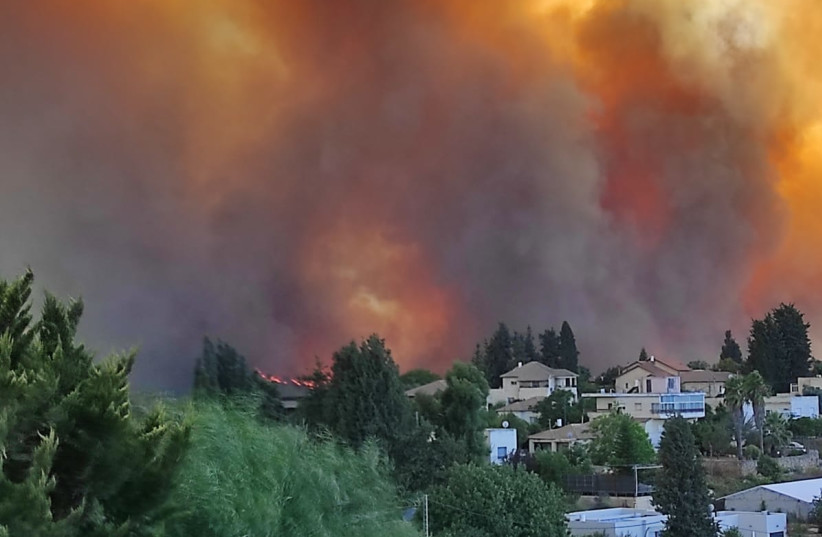Michah and Shoshanna Harrari have been making harps nonstop for 40 years. That streak came to a temporary end this week when their workshop in Ramat Raziel burned down in the massive fire that swept through the hills and towns north of Jerusalem.
The wooden, custom-made harps, inspired by Biblical and historical depictions of Jewish harpists such as King David, have been an institution in Israel since the couple made aliyah from the United States in the 1980s.
The Harraris spoke to The Jerusalem Post on Wednesday from their home nearby in the community, which was miraculously spared.
“I was in my clinic with a family and having a very nice conversation,” Shoshanna told the Post, “and suddenly we looked out the window and the sky was black with smoke.”
Shoshanna said it was so shocking she did not fully grasp the extent of the danger, and turned down the family’s offer to drive her and her husband to safety.
But when Michah saw the smoke, he immediately ran down to the harp shop, located near the Harrari’s home.
“There were walls of fire about 20 m. high with wind and flames blowing straight at you,” he said.

Realizing there was nothing he could do, he made his way back to the house to try in vain to hose down their home for the past 30 years with a fire hose. “He fought like King David,” his wife said, “but it was like trying to put out a camp fire with a teacup. All the electricity was out, and the smoke was so thick your eyes teared up.”
The Harraris ran to the car with nothing but the clothes on their backs and drove as fast as they could.
They spent a fitful night at a friend’s house thinking for sure they had lost everything. When they returned the next morning, the flames had stopped about 2 m. from their front door. “It was a miracle, “Shoshanna said. “We came home to find our home exactly as we left it the day before. I am just thankful to God and to all our friends and neighbors who were so supportive.”
Not all their neighbors were so lucky. Shoshanna said that ironically, a nearby family with a house made of solid stone was burned to the ground, while their wooden house was somehow spared. “It’s not logical,” she said.
The Harraris attribute a Post article about their unique hand-carved harps from almost 40 years ago to their success.
The 1984 article entitled “The Return of the Harp” by veteran Post journalist Helga Dudman declared the then young couple to be likely the first harp makers in Israel since Biblical days. Since then, the harps have been custom designed for musicians, collectors, museums and even the Temple Institute who requested replicas of the harps once played in the ancient Holy Temple.
The Harraris are taking an attitude of hope and gratitude that their life’s work will continue.
“All around us are trees that look dead and burnt,” said Shoshanna, who is also a nutrition counselor, naturopath and author of two books, The Garden of Spices: Recipes for Life and The Seven Healing Fruits of Israel. “Their leaves are brown and so sad and pitiful but I know from experience that when the rains come in the winter, their roots are strong and will bring the trees back to life.”
“Our roots are strong too,” she continued, “and we are not giving up and we will come back and become more beautiful like the trees and like the harp. The harp is a symbol of Israel and of King David, and our people cannot just be destroyed like that.”
The Kedoshim Forest stretches from the Mateh Yehuda region, just north of Jerusalem where Ramat Raziel is located, to Beit Shemesh. It began in 1951 by the Jewish National Fund and B’nai B’rith in memory of victims of the Holocaust with approximately six million tree planted, representing the Jews murdered by the Nazis. This week, over 6,000 acres were charred in the blaze.
“I don’t think there is anything like the people of Israel,” Shoshanna said, “they pull together after a disaster or tragedy.” Founded in 1948 as a moshav, Ramat Raziel’s residents have pulled together. “I spoke to neighbors I usually don’t see,” Shoshanna said. “I really feel that we have a lot more strength than we think we do and we need to dig deep into ourselves to access it. It says the Jewish people are supposed to be a light unto the nations and I believe we are, I just hope that light isn’t a forest fire. But we cannot be miserable and angry but seek the compassion we have for each other.”
Friends and neighbors have established a donation page for the Harraris at https://givechak.co.il/20730
